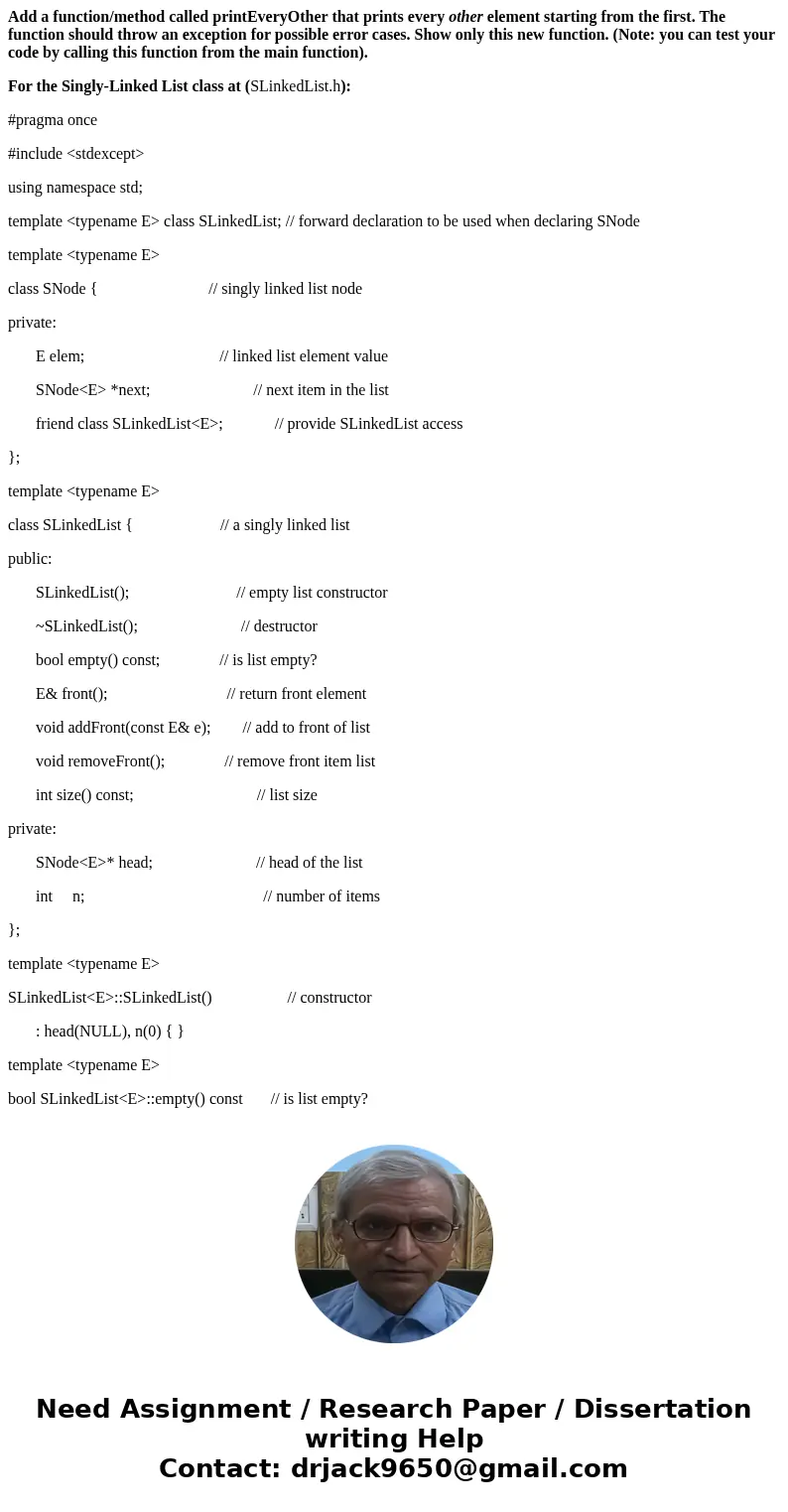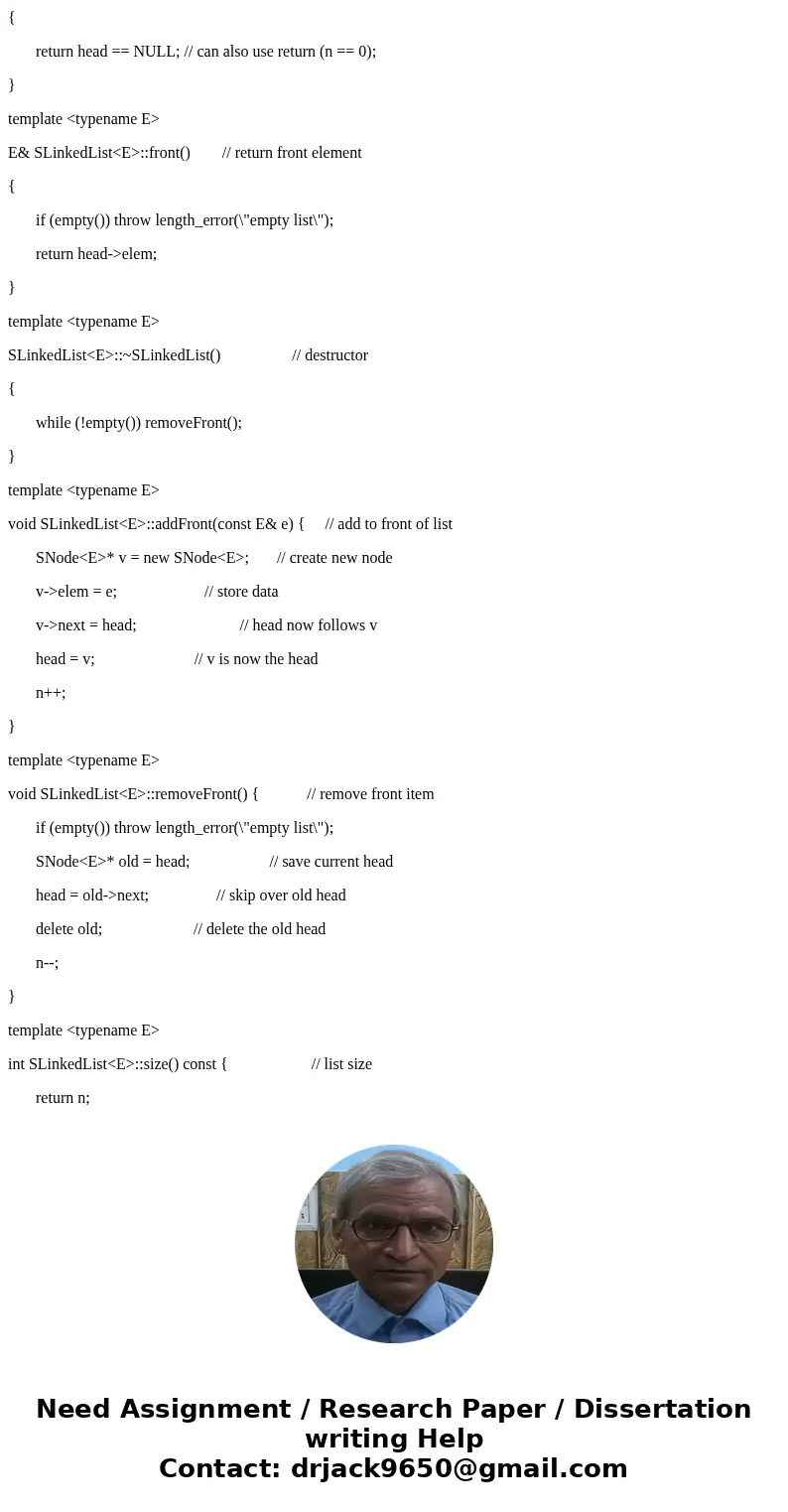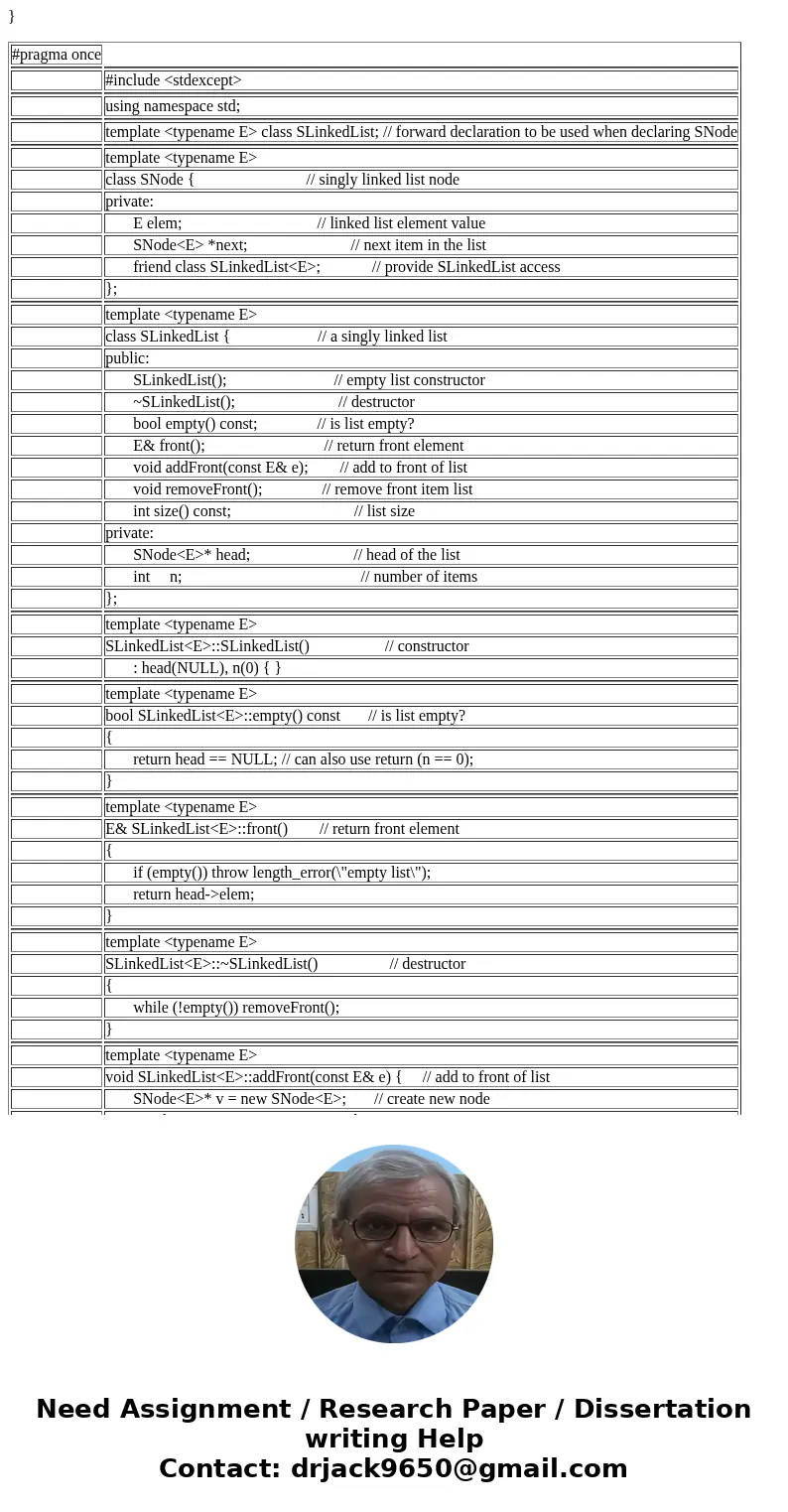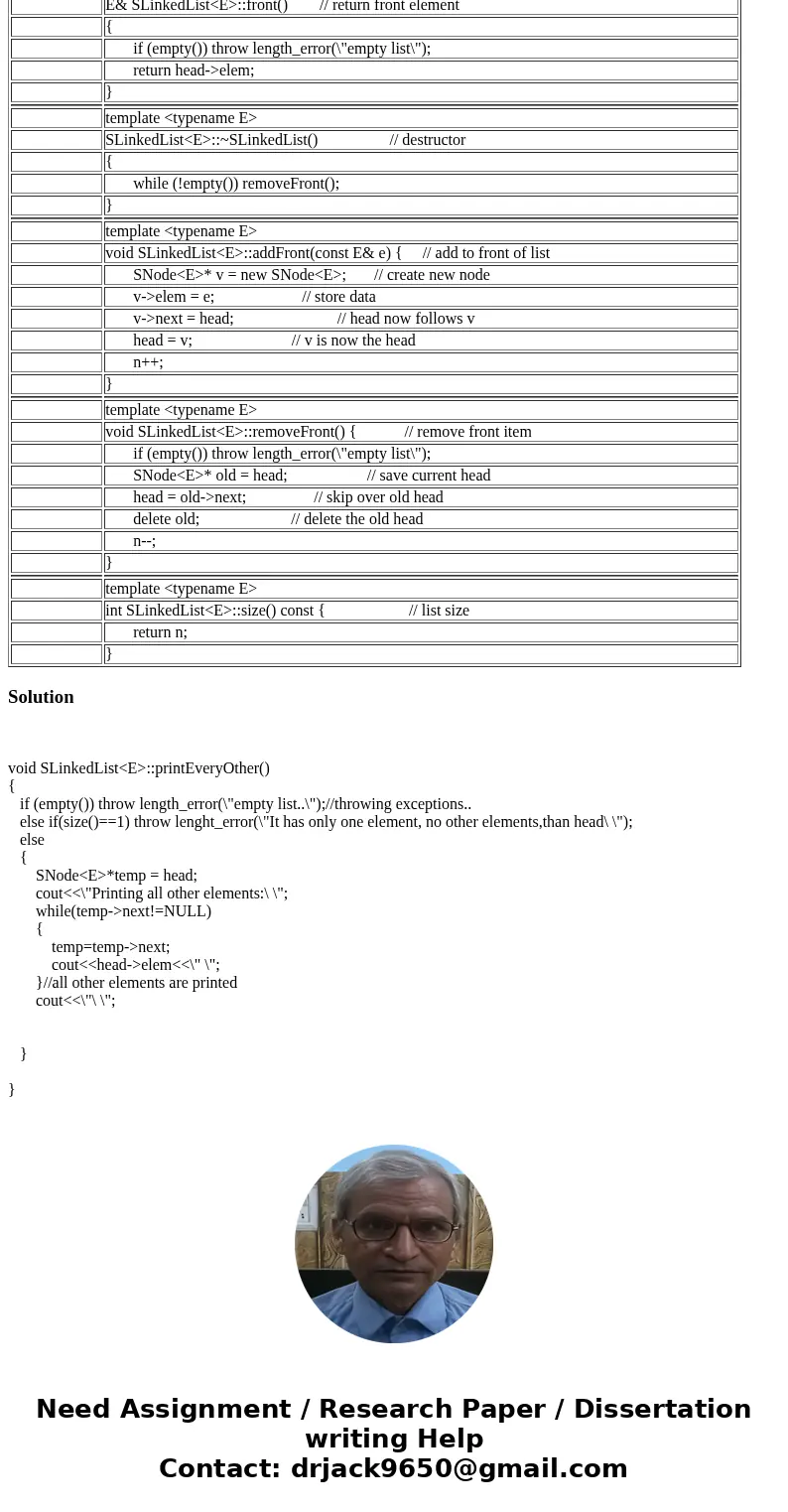Add a functionmethod called printEveryOther that prints ever
Add a function/method called printEveryOther that prints every other element starting from the first. The function should throw an exception for possible error cases. Show only this new function. (Note: you can test your code by calling this function from the main function).
For the Singly-Linked List class at (SLinkedList.h):
#pragma once
#include <stdexcept>
using namespace std;
template <typename E> class SLinkedList; // forward declaration to be used when declaring SNode
template <typename E>
class SNode { // singly linked list node
private:
E elem; // linked list element value
SNode<E> *next; // next item in the list
friend class SLinkedList<E>; // provide SLinkedList access
};
template <typename E>
class SLinkedList { // a singly linked list
public:
SLinkedList(); // empty list constructor
~SLinkedList(); // destructor
bool empty() const; // is list empty?
E& front(); // return front element
void addFront(const E& e); // add to front of list
void removeFront(); // remove front item list
int size() const; // list size
private:
SNode<E>* head; // head of the list
int n; // number of items
};
template <typename E>
SLinkedList<E>::SLinkedList() // constructor
: head(NULL), n(0) { }
template <typename E>
bool SLinkedList<E>::empty() const // is list empty?
{
return head == NULL; // can also use return (n == 0);
}
template <typename E>
E& SLinkedList<E>::front() // return front element
{
if (empty()) throw length_error(\"empty list\");
return head->elem;
}
template <typename E>
SLinkedList<E>::~SLinkedList() // destructor
{
while (!empty()) removeFront();
}
template <typename E>
void SLinkedList<E>::addFront(const E& e) { // add to front of list
SNode<E>* v = new SNode<E>; // create new node
v->elem = e; // store data
v->next = head; // head now follows v
head = v; // v is now the head
n++;
}
template <typename E>
void SLinkedList<E>::removeFront() { // remove front item
if (empty()) throw length_error(\"empty list\");
SNode<E>* old = head; // save current head
head = old->next; // skip over old head
delete old; // delete the old head
n--;
}
template <typename E>
int SLinkedList<E>::size() const { // list size
return n;
}
| #pragma once | |
| #include <stdexcept> | |
| using namespace std; | |
| template <typename E> class SLinkedList; // forward declaration to be used when declaring SNode | |
| template <typename E> | |
| class SNode { // singly linked list node | |
| private: | |
| E elem; // linked list element value | |
| SNode<E> *next; // next item in the list | |
| friend class SLinkedList<E>; // provide SLinkedList access | |
| }; | |
| template <typename E> | |
| class SLinkedList { // a singly linked list | |
| public: | |
| SLinkedList(); // empty list constructor | |
| ~SLinkedList(); // destructor | |
| bool empty() const; // is list empty? | |
| E& front(); // return front element | |
| void addFront(const E& e); // add to front of list | |
| void removeFront(); // remove front item list | |
| int size() const; // list size | |
| private: | |
| SNode<E>* head; // head of the list | |
| int n; // number of items | |
| }; | |
| template <typename E> | |
| SLinkedList<E>::SLinkedList() // constructor | |
| : head(NULL), n(0) { } | |
| template <typename E> | |
| bool SLinkedList<E>::empty() const // is list empty? | |
| { | |
| return head == NULL; // can also use return (n == 0); | |
| } | |
| template <typename E> | |
| E& SLinkedList<E>::front() // return front element | |
| { | |
| if (empty()) throw length_error(\"empty list\"); | |
| return head->elem; | |
| } | |
| template <typename E> | |
| SLinkedList<E>::~SLinkedList() // destructor | |
| { | |
| while (!empty()) removeFront(); | |
| } | |
| template <typename E> | |
| void SLinkedList<E>::addFront(const E& e) { // add to front of list | |
| SNode<E>* v = new SNode<E>; // create new node | |
| v->elem = e; // store data | |
| v->next = head; // head now follows v | |
| head = v; // v is now the head | |
| n++; | |
| } | |
| template <typename E> | |
| void SLinkedList<E>::removeFront() { // remove front item | |
| if (empty()) throw length_error(\"empty list\"); | |
| SNode<E>* old = head; // save current head | |
| head = old->next; // skip over old head | |
| delete old; // delete the old head | |
| n--; | |
| } | |
| template <typename E> | |
| int SLinkedList<E>::size() const { // list size | |
| return n; | |
| } |
Solution
void SLinkedList<E>::printEveryOther()
{
if (empty()) throw length_error(\"empty list..\");//throwing exceptions..
else if(size()==1) throw lenght_error(\"It has only one element, no other elements,than head\ \");
else
{
SNode<E>*temp = head;
cout<<\"Printing all other elements:\ \";
while(temp->next!=NULL)
{
temp=temp->next;
cout<<head->elem<<\" \";
}//all other elements are printed
cout<<\"\ \";
}
}




 Homework Sourse
Homework Sourse